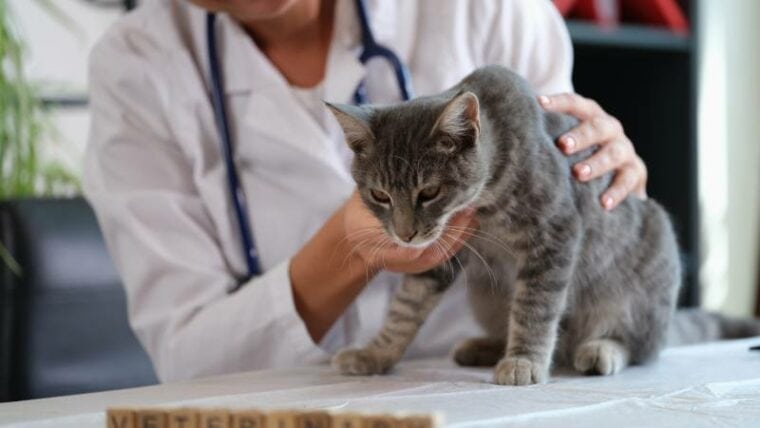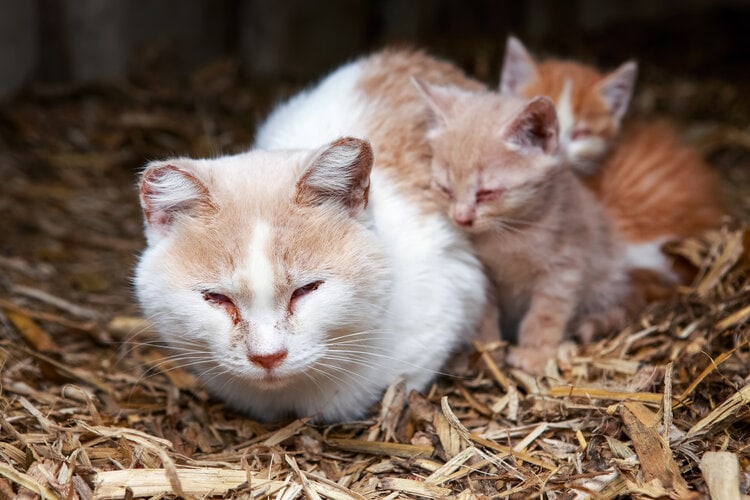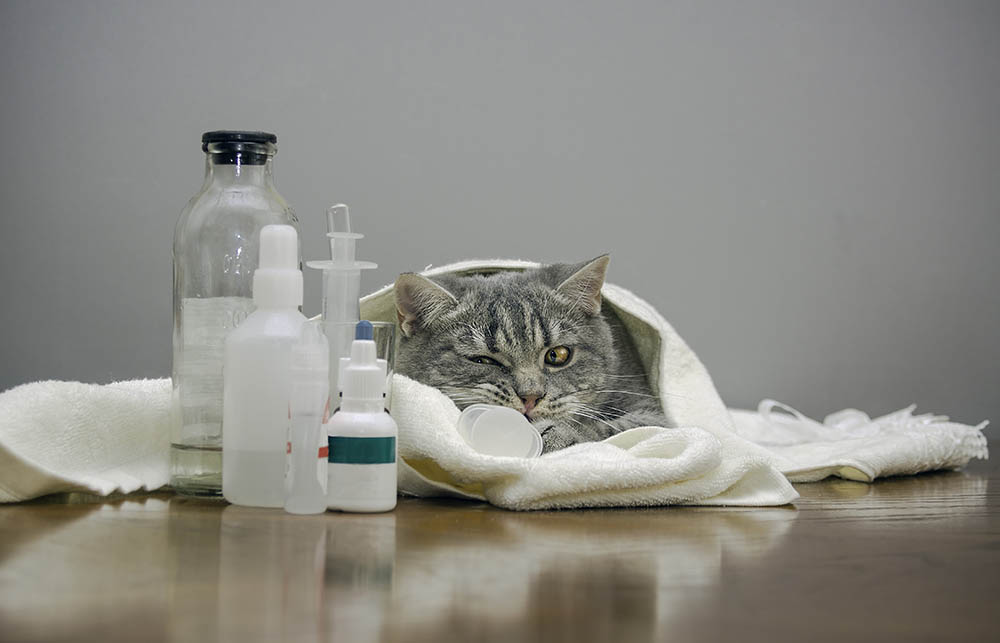
Though we hear about it more so in dogs, cats can also get kennel cough just as easily. Cats typically don’t carry the reputation of being kennel cough carriers only because they do not usually have as frequent exposure to boarding kennels as their canine counterparts.
Unfortunately, not only can cats get kennel cough and pass it to other cats, but cats and dogs can also even pass it to each other. Some but not all of the microorganisms responsible for causing kennel cough in dogs also affect cats.
Kennel cough is highly contagious and will spread rapidly. It’s mostly seen in boarding kennels, veterinary clinics, shelters, and any places where large numbers of animals come together.

What Is Kennel Cough and What Are the Symptoms?
Though kennel cough in cats can be caused by a variety of microorganisms such as adenovirus, reovirus, distemper virus, mycoplasma, and parainfluenza virus, the most common of the causes is the Bordetella bronchiseptica bacterium. This is the reason you will typically hear Kennel Cough being referred to as Bordetella.
The incubation period of kennel cough ranges anywhere from 2 to 14 days after the cat is exposed. The signs and symptoms can begin anytime within this time frame.

A kennel cough infection can range from mild to severe. Cats with underlying health conditions, young kittens, and older cats with weaker immune systems are at higher risk of severe infection. If your cat is exhibiting any unusual symptoms, it’s best to contact your veterinarian immediately for a health evaluation.

Transmission of Kennel Cough

Kennel cough is transmitted directly from other animals when respiratory droplets containing the virus or bacteria are inhaled directly into the respiratory tract. Kennel cough can be passed between species, so if a cat comes in contact with an infected dog, it can be transmitted between the two.
Cats can also contract kennel cough indirectly by coming in contact with an object that has been exposed to infected respiratory droplets of another animal. The bacteria may survive anywhere from one to two weeks on surfaces, so it is always recommended that a surface is disinfected thoroughly for extra precaution.
Because it is highly contagious, it tends to spread rapidly in places that are frequented by animals. The most high-risk places for your pet to become infected are at boarding facilities or a veterinary clinic. As mentioned, it is also easy for animal shelters to become infected due to the number of animals coming and going.

Diagnosis and Treatment

A few tests can be run to diagnose kennel cough. A cat that is exhibiting the telltale symptoms of kennel cough can get a nasal or throat swab completed. The samples will then be tested to confirm the type of infection. A CBC or complete blood count can be performed as well as a chest X-ray in the more severe cases.
It’s very important to visit the veterinarian for a diagnosis since your cat’s cough could be due to another underlying health condition that is unrelated to kennel cough. Many other health issues can result in cough and getting the correct diagnosis is imperative for the correct treatment of the ailment.
Typically, kennel cough is relatively mild and does not need to be treated with antibiotics. In healthy animals, the infection tends to run its course just like the common cold does in us, humans. More severe infections will be treated with antibiotics for up to 14 days and possibly depending on severity.
If your cat is at high risk of pneumonia or dehydration, hospitalization might be required, so the veterinarian can administer IV fluids, antibiotics, and keep the cat monitored. This typically only happens in the most severe cases where the cat is immunocompromised in some way or has other underlying conditions.
Because kennel cough is highly contagious, if your cat is diagnosed you will want to sanitize and disinfect their environment. This includes bedding, bowls, toys, and all surfaces throughout the home and even the vehicle they have traveled in. This is especially important if you have other pets or kids at home.
Once treatment has been administered and you return home with your cat, you will need to keep them quarantined from other pets within the household to prevent ongoing transmission.
Preventing Kennel Cough

There is a vaccine available for Bordetella that can be administered to both cats and dogs. Most boarding facilities and veterinary clinics will require the vaccine before boarding your pet to minimize the risk of the infection spreading throughout the facility. This vaccination is highly recommended for pets that will be exposed to a large number of other animals.
Other ways to prevent kennel cough are to keep cats either individually or in small groups that are isolated from others. Practice excellent hygiene and frequently sanitize and disinfect surfaces. If any animal in your home begins showing the signs and symptoms of kennel cough, find a comfortable spot to keep them isolated from others as you wait to get them into the veterinarian.

Conclusion
Cats may not present with kennel cough nearly as often as dogs, but they are still at risk of catching this complex infection. Kennel cough is typically seen after cats are boarded at a facility or the veterinarian. While it’s typically mild, it can become severe and require treatment and even hospitalization in the worst cases. It’s best to be on the lookout for any unusual symptoms and reach out to your veterinarian if you have any concerns.
- Next on your reading list: Can Cats Catch Colds? Symptoms, Causes, and Care
Featured Image Credit: megaflopp, Shutterstock






